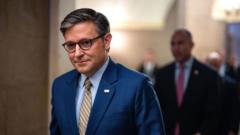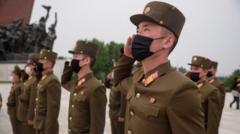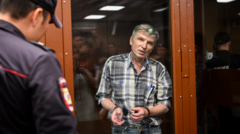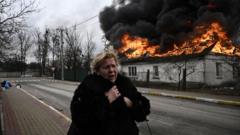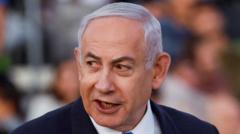Nadezhda Buyanova, a 68-year-old pediatrician, has been handed a five-and-a-half-year prison sentence for purportedly disseminating false information about the Russian armed forces, according to her lawyers and supporters. Her situation highlights the tightening restrictions on free speech within the context of the ongoing Ukraine conflict.
Russian Pediatrician Sentenced to Five Years for Alleged Anti-War Remarks
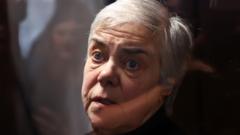
Russian Pediatrician Sentenced to Five Years for Alleged Anti-War Remarks
A Moscow doctor faces lengthy imprisonment for comments allegedly made about the military, marking a significant increase in state repression regarding dissent in Russia.
In an emotionally charged courtroom scene, Ms. Buyanova was escorted, handcuffed, into a cage-like enclosure while the trial was held. She expressed her disbelief at her situation, stating, "It's absurd, just absurd," as she faced the consequences of alleged remarks made during a consultation with a grieving mother of a soldier. Although the accuser claimed Ms. Buyanova made derogatory comments about the deceased soldier and Russian soldiers in general, Buyanova vehemently denies the allegations, emphasizing the lack of any tangible evidence to support the claims.
Following her arrest in February, the pediatrician experienced a period of house arrest before being placed in pre-trial detention, a move criticized by her legal team as disproportionate. As the sentence was read, her supporters in the court reacted with shock, calling the decision "monstrously harsh." Her lawyer, Oskar Cherdzhiyev, asserted that the ruling underscores the dire state of freedom of expression in Russia under current laws that suppress criticism of military actions.
One of Buyanova's supporters articulated the distress felt by those attending the trial, noting the necessity of their presence as a form of solidarity despite the grim outcome they anticipated. The case is emblematic of a broader trend in Russia since the invasion of Ukraine—a series of legal measures designed to stifle dissent, which recalls repressive tactics from the Soviet era. The impact of these laws is evident in civil society, as individuals now face serious repercussions for simply voicing opinions perceived as critical of the military.
The ongoing conflict in Ukraine continues to reshuffle the landscape of civil liberties in Russia, as punitive measures against dissent grow more severe, leaving many citizens to navigate a landscape of fear over their ability to speak freely.
War in Ukraine has intensified the observance of dissent’s repercussions in Russia, with Buyanova’s case reflecting a disturbing reality for those who challenge the state narrative.
Following her arrest in February, the pediatrician experienced a period of house arrest before being placed in pre-trial detention, a move criticized by her legal team as disproportionate. As the sentence was read, her supporters in the court reacted with shock, calling the decision "monstrously harsh." Her lawyer, Oskar Cherdzhiyev, asserted that the ruling underscores the dire state of freedom of expression in Russia under current laws that suppress criticism of military actions.
One of Buyanova's supporters articulated the distress felt by those attending the trial, noting the necessity of their presence as a form of solidarity despite the grim outcome they anticipated. The case is emblematic of a broader trend in Russia since the invasion of Ukraine—a series of legal measures designed to stifle dissent, which recalls repressive tactics from the Soviet era. The impact of these laws is evident in civil society, as individuals now face serious repercussions for simply voicing opinions perceived as critical of the military.
The ongoing conflict in Ukraine continues to reshuffle the landscape of civil liberties in Russia, as punitive measures against dissent grow more severe, leaving many citizens to navigate a landscape of fear over their ability to speak freely.
War in Ukraine has intensified the observance of dissent’s repercussions in Russia, with Buyanova’s case reflecting a disturbing reality for those who challenge the state narrative.


